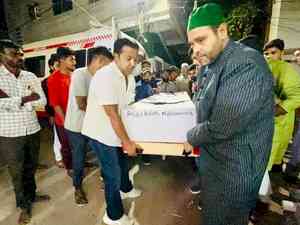2-day seminar remembering Jallianwala Bagh Massacre of 1919 kick starts at PU
Author(s): City Air NewsChandigarh, April 5, 2019: Department of History, Panjab University, Chandigarh organized a two day seminar remembering Jallianwala Bagh Massacre of 1919 which kick started here today. The inaugural session of the...


Chandigarh, April 5, 2019: Department of History, Panjab University, Chandigarh organized a two day seminar remembering Jallianwala Bagh Massacre of 1919 which kick started here today.
The inaugural session of the seminar had an auspicious beginning with the lighting of the Deepshikha to the entrancing recitation of the Saraswati Vandana. The dignitaries were welcomed to the dais in a environment friendly manner with blooming potted plants and mementoes of the event.
Dr. Raghuram Rao Akkinepally, Director- NIPER, began his address by admitting that his participation in the seminar was an adventure as he considered himself the odd man out in terms of being a man of science in a room full of historians and history students. He recalled that several visits to Jallianwala Bagh have not lessened the impact that the place of such carnage evokes still in the hearts and minds of all visitors. Prof Rao compared the Jallianwala Bagh incident to the Tianammen Square massacre in China, in terms of the violence, repression and ruthlessness.
Prof K L Tuteja, Eminent Historian and former Professor of Modern Indian History at Kurukshetra University, in his lecture brought to the fore many hitherto unknown and interesting aspects of the event. He reflected that the remembering of the Jallianwala Bagh incident was different before 1947 and is different today. The Indian nationalists dwelled on the brute use of the imperial force and the inherent imperialistic and animalistic aspect of the vent before 1947. Nationalists were keen to involve the maximum number of people in the freedom struggle and for them, Jallianwala Bagh incident was the best example of colonial brutality wherein Dyer became an icon of brutal force. Today, we remember the incident as a sacrifice, as an example of how Indians sacrificed their all for the cause of freedom. We are remembering the same incident, but in different contexts. When anything is remembered by students of history, there has to be an interpretation and understanding and putting into context. In history, tradition is important, but it has to be understood.
Prof Devender Singh Thakur, Secretary to the Vice Chancellor, Panjab University, in his address deliberated on the legal-constitutional aspects which continue to plague Indian and indeed all societies. He lamented the fact that people today have become right centric, and have forgotten that they have responsibilities also. Everyone is interested in exercising their Rights, but no one discharges their Duties. He emphasised on the importance of organising such commemorative events that educate, awaken interest and encourage the students and also creates new perspectives and narratives.
Dr Anju Suri, Chairperson, Department of History, Panjab University expounded on the theme and importance of the need for remembering Jallianwala Bagh in her introduction to the seminar. After a brief retrospective of the theme, she dwelled upon the relevance and need of the seminar recalling and remunerating on the vents of 1919, especially Jallianwala Bagh. She placed the event in a historical as well as academic and contemporary perspective.
The Technical Session which followed the inauguration, was chaired by Prof. Viney Kapoor, Honourable Vice Chancellor, National Law University, Sonepat, Haryana. Prof. Karamjit Singh, Registrar, Panjab University, Chandigarh was the guest of honour.
The session included 4 Resource persons namely Prof. S.S Sohal, Prof. M.Y Ganai, Prof. Arun Mehra and Prof. Sukhmani Bal Riar who presented their papers and discussed the issues concerning Mutiny Fixated Mind Set and Paternalstic Authoritarianism of the British Government responsible for the Massacre. They also touched upon historiographical accounts, Parliamentary Debates and Disorders Enquiry Committee Reports to unfold the brutality of the Jallianwala Bagh incident.
The second technical session, Prof. Ronki Ram, Dean, Faculty of Arts, chaired the session with 6 Resource persons on the panel namely Dr. Baljeet Singh, GHG College, Gursar Sadhar, Ludhiana, Dr. Parveen, Department of Punjabi, USOL, Dr. Sarabjit Singh, Department of Punjabi, Prof. Sukhdev Singh Sirsa, Department of Punjabi, Dr. Gurmeet Singh, Department of Hindi and Dr. Jasbir Singh, Department of History, PU. Prof. Navdeep Goyal, Chairperson, Department of Physics was the guest of honour in the session.

 cityairnews
cityairnews 















